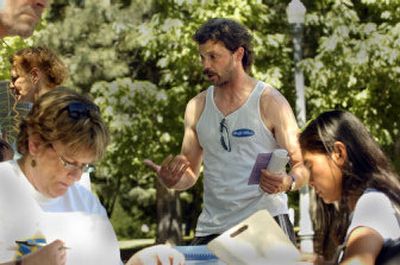Lawyers dispense free advice in the park

Terrence Cochran needed legal advice – on bankruptcy, child visitation rights and a traffic ticket. But he was afraid that going to a lawyer’s office would cost too much.
So, the Spokane Valley man visited Riverfront Park Saturday, where he had heard that lawyers would be on hand to offer free legal advice. He’d seen a flier about the new program, called Street Lawyers.
That’s how Cochran found Patty Grossman, one of three lawyers who had set up a card table in the park. When he walked away Saturday, he had a clear plan.
The 35-year-old got the name of a lawyer who works with the Northwest Justice Project’s Coordinated Legal Education, Advice and Referral system. It’s a federally funded program that offers free legal services to low-income people who need help with non-criminal legal issues.
Cochran was one of more than 20 people Saturday who showed up with their notes and paperwork to take advantage of a chance to “talk to a lawyer for free.”
This is the first year for the Street Lawyers program in Spokane. The same program has been operating in Bellingham for 10 years.
“The purpose is to remove that barrier of ‘I don’t want to go to a lawyer because it will cost me $200 or more,’ ” said Breean Beggs, executive director of the Center for Justice and founder of the Street Lawyers program in Bellingham and Spokane.
People who go can quickly find out whether or not they have a genuine legal problem. If they do, they are referred to lawyers who can help them pursue their cases.
One of three conclusions is usually reached as a result of the 10- to 15-minute consultations with lawyers, Beggs said.
“The first is ‘Boy, they really have a legal problem that they need to deal with’ – which we can confirm and say, ‘Here is the way to go forward,’ ” Beggs said.
The second conclusion is that there might be a legal problem, but it’s not something that can be resolved.
“For example, someone’s neck still hurts from a car crash that’s more than three years old. The statute of limitations has run out in a case like that,” Beggs said. “Another example is a 17-year-old who thinks they have a constitutional right to vote. They don’t.”
The third conclusion that can be reached is: Yeah that’s a legal problem, but it’s going to cost a lot of money to carry it through.
“Our goal is to help resolve it (the legal issue) quickly by telling them what they need to do,” Beggs said.
In Cochran’s case, Grossman told him about a change in bankruptcy law that meant he had only seven to 10 days from Saturday to file.
“I didn’t know that, so I’m glad I came,” he said. She also informed him that his ex-wife was in contempt of court for not paying him $5,000 that she owed him.
Cochran’s problems started, he said, after a motorcycle accident in California put him in a coma for six months.
Grossman, the 31-year veteran lawyer who talked with Cochran, said she enjoyed participating in the Street Lawyers program and hoped it would continue next year.
Beggs said he started the program in Spokane because “why not give some free advice and help someone? It helps the whole community.”
Probably one of the biggest unaddressed legal needs is employment law, which can be anything from discrimination to overtime issues. On Saturday, several people asked questions about disability benefits, employment rights and discrimination.
Other popular questions were about child custody, landlord and tenant rights, powers of attorney and divorce.
“The beauty is that lawyers, who usually charge $150 to $250 an hour, are helping people by giving their legal knowledge for free,” Beggs said.
The 30 lawyers who are participating this summer volunteered.
“Our lawyers are from all walks of law,” Beggs said. “They volunteer their time, but they love it. Normally, they are stuck in their office dealing with the same type of clients. Some say it’s the best legal experience they’ve had. You get to make a difference in a lot of people’s lives in one day.”
Beggs and his wife, Laurie Powers, founded the Street Lawyers program in Bellingham 10 years ago. Beggs said it’s quite popular, and people now line up there on Saturdays waiting for help. He’s hoping for similar success in Spokane.
He said over the years he and his wife have been able to help lots of people. Most had legitimate legal problems; some did not.
“My wife talked to a woman who was convinced that Michael Douglas and Catherine Zeta-Jones were stalking her,” Beggs said. “My wife happened to have a People magazine that said the couple was in the Bahamas that week. The woman was so relieved.”
And then there was the woman who clearly had enough money for legal services but, because of all the negative articles she had read about attorneys, was worried that a lawyer would swindle her.
If she hadn’t sought their free advice and changed her will, Beggs said, it would have cost her heirs a lot of money in taxes that wasn’t necessary.